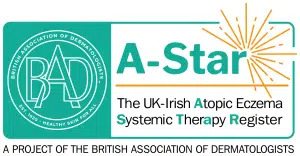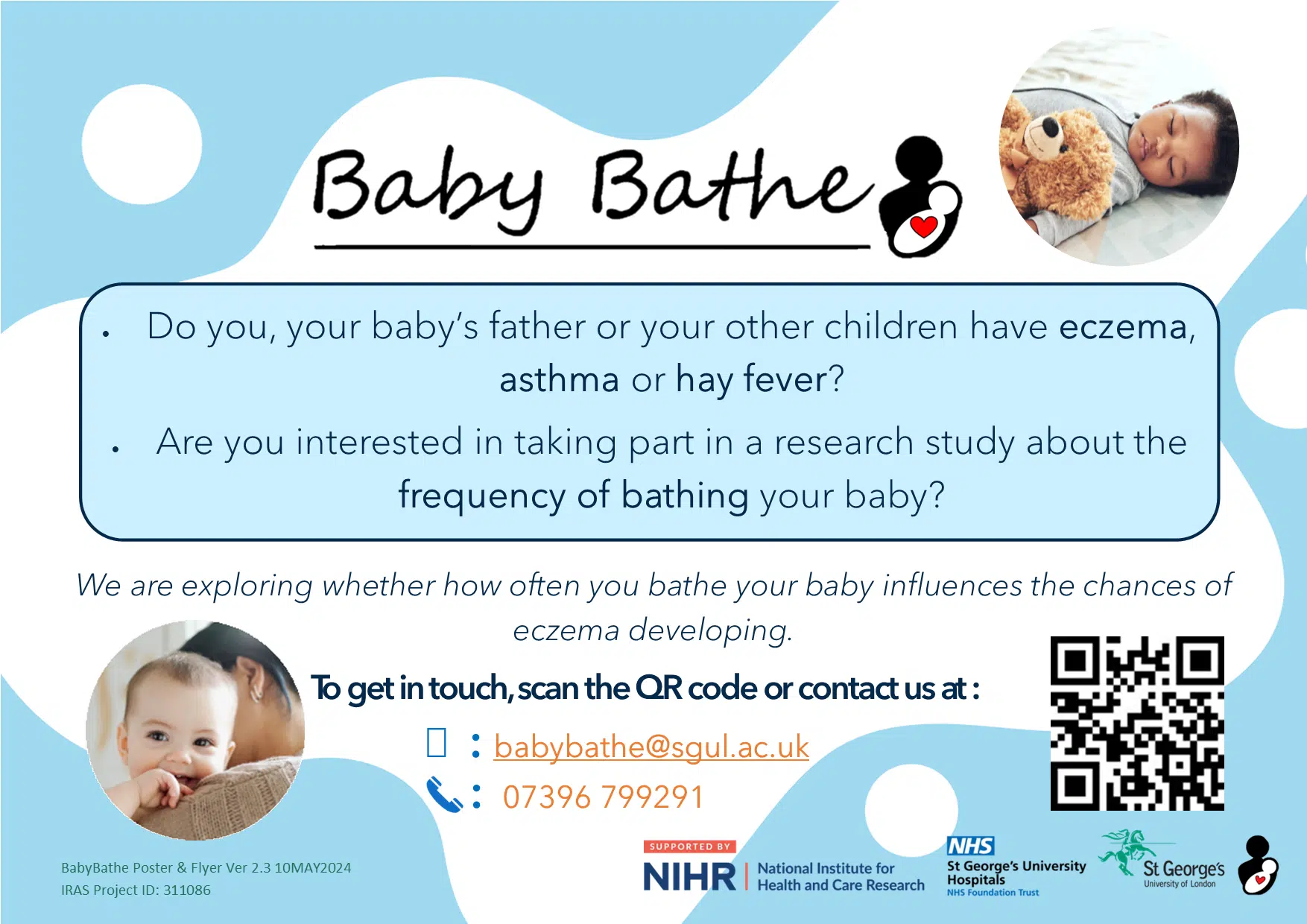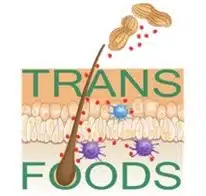National Eczema Society supports and highlights research trials and projects that we truly believe can improve the lives of people living with eczema. Here are some examples of the trials we’ve backed, promoted or featured in our members’ magazine, Exchange.
ALPHA trial
The ALPHA trial has now concluded. It was an exciting study that compared two powerful treatments, Alitretinoin and PUVA therapy, for adults with severe hand eczema that doesn’t respond well to prescription steroid creams. If you’ve been struggling to control your hand eczema, this research aims to discover which treatment works best to bring lasting relief. The data is now being analysed and we hope to share the results from this trial soon.
A-STAR study

The UK-Irish Atopic Eczema Systemic Therapy Register (A-STAR) study is undertaking ground-breaking research to uncover how effective systemic medications are in treating atopic eczema. A-STAR will explore not only how these treatments improve disease severity and enhance quality of life but also their safety during long-term use. Recruitment for this study is open. Join us on this important journey to better understand eczema treatments and help pave the way for more effective solutions!
Baby Bathe

Recruitment Open! Are you pregnant and based in London? Does either parent or other child have a doctor’s diagnosis of asthma eczema or hayfever? Our research explores if the frequency you bathe your baby in the first 6 months of life impacts whether your baby gets eczema – email babybathe@sgul.ac.uk today!

BEACON Trial
BEACON is a UK-wide research trial comparing commonly-prescribed systemic medicines used to treat adults with more severe eczema, to find out which treatment is most effective and preferable. The research team hopes the trial findings will help people with more severe eczema receive the best treatment for them first-time round in future. BEACON is recruiting patients now to take part in this exciting study.
BIOMAP
BIOMAP is an exciting international research initiative that harnesses the latest advancements in translational medicine. This exciting endeavour aims to accelerate drug discovery and enhance disease management for individuals living with atopic eczema and psoriasis.
Eczema Care Online (ECO)
Introducing the Eczema Care Online (ECO) research study — a game-changer in eczema self-care! This innovative study was dedicated to empowering individuals with the knowledge and tools they need to take charge of their eczema treatment. By enhancing understanding of various eczema therapies, ECO aims to transform attitudes, skills, and habits surrounding treatment use. Get ready to embark on a journey toward better skin health and improved quality of life as we work together to promote effective self-care strategies for eczema!
Fractures and eczema
Exciting research from the London School of Hygiene and Tropical Medicine! A ground-breaking study led by Prof. Sinead Langan has uncovered a surprising link between eczema and bone fractures. This major research finding could change the way we understand and manage eczema, shedding light on potential health risks associated with this common skin condition.
Infections and eczema
Get ready for some exciting insights from Consultant Dermatologist Susannah George and patient representative Anjna Rani. They’re diving into the Cochrane research review on treatments aimed at reducing infections from the bacteria Staphylococcus aureus in individuals with eczema. Together, they’ll explore the evidence behind what really works to treat infected eczema, giving you valuable information that could make a difference in your care. Don’t miss out on these essential findings that could help you or your loved ones manage eczema more effectively.
SMEDIS
Research opportunity – Want to help improve eczema medicine safety?
We [National Eczema Society] are excited to let you know about an innovative research study using social media to better understand people’s views on medicine safety.
🔍 What’s the study about?
The Social Media Dermatological Intervention Study (SMEDIS) is exploring social media conversations about Janus-Kinase (JAK) Inhibitor medicines – these are used to treat several conditions including atopic eczema, Crohn’s disease and rheumatoid arthritis.
👥 Who Can Participate?
The research team is looking for participants aged 18 and up to help review social media conversations. You will need to have access to internet enabled computer or mobile computing device. Your insights will help teach their computer systems to better understand this valuable data. As a thank you for your time, you’ll receive a £20 Amazon voucher!
Who is doing the research?
The project is a collaboration between the Northern Care Alliance NHS Foundation Trust, the University of Manchester and Manchester Metropolitan University.
👉 Want to find out more?
Please complete this form to register your interest in participating: FORM.
If you have any questions, you can reach out to s.ajao@mmu.ac.uk For more information on the project, visit: SMEDIS GitHub.
The National Eczema Society (NES) is committed to advancing eczema research by working with reputable organizations, institutions, and researchers. However, the charity does not endorse, guarantee, or take responsibility for the conduct, findings, or outcomes of any independent studies, research projects, or clinical trials conducted by other organizations. Participation in external studies is entirely voluntary.
Rapid Eczema Trials
The Rapid Eczema Trials project is designed to empower individuals with eczema to take control of their care! This innovative initiative puts people with eczema and their caregivers in the driver’s seat, addressing common questions about managing the condition, like how often to wash, what to eat, and the best ways to use treatments. With this project, we aim to fill the gaps in research and provide the guidance needed to make informed decisions for healthier skin.
Global Patient Initiative for Optimal Eczema Care
National Eczema Society was thrilled to be part of an exciting international charity initiative that aimed to redefine what ‘good eczema care’ truly means from the perspective of patients and caregivers! The Global Patient Initiative for Optimal Eczema Care is a mission to create meaningful measures for healthcare services and treatment satisfaction, ensuring the voices of those living with eczema are heard. Download and read the results from this work. We will continue to work to shape policy recommendations that prioritise the experiences and needs of eczema patients, paving the way for better care worldwide.
SLEEP study
The National Eczema Society was thrilled to fund this exciting research study that explored the impact of sleep disturbances on children with eczema and their families! This ground-breaking study aims to uncover new insights that will help improve sleep for children and young people dealing with eczema. By shedding light on this important issue, we hope to enhance support strategies and pave the way for future research in this vital area. Together, let’s ensure that every child with eczema gets the restful sleep they deserve.
SOFTER trial
The Softened Water for Eczema Prevention (SOFTER) trial has concluded. This exciting study took place at Guy’s and St Thomas’ Hospital in London, exploring whether using water softeners can help reduce the risk of eczema in babies. Building on earlier research that showed that hard water can harm the skin’s protective barrier and potentially lead to eczema. This trial aimed to provide valuable insights that could make a real difference for families. Stay tuned as we uncover the potential benefits of softened water in keeping our little ones’ skin healthy.
TECH study
The Teleconsultations for Eczema in Children (TECH) study has finished collecting data. This exciting research explored how effective and acceptable teleconsultations are for the follow-up care of children and young people with eczema. By gathering insights and experiences from both patients and parents, this study aimed to shed light on the benefits of virtual care and help shape future research in this important area. We hope to share soon how teleconsultations can enhance eczema management and make life easier for families!
TRANS-FOOD study

Exciting news for parents! This ground-breaking study is on a mission to reduce the risk of peanut allergies in babies and children caused by skin contact. Researchers are diving deep to uncover the mechanisms behind this risk and explore how we can adapt skincare practices to keep children safe. Plus, they’re investigating how peanut snacks are manufactured to minimize the exposure to peanut protein in the environment. Together, we’re working towards a future where peanut allergies can be prevented, giving families peace of mind!
Disclaimer
The National Eczema Society (NES) is committed to supporting advancements in eczema research by partnering with reputable organizations, institutions, and researchers. However, NES does not endorse, guarantee, or take responsibility for the conduct, findings, or outcomes of any independent studies, research projects, or clinical trials conducted by external entities. Participation in external studies is entirely voluntary, and any decisions made by individuals, healthcare providers, or third parties based on external research are their own.
NES provides information on research opportunities for educational and informational purposes only and does not verify, monitor, or control the methodologies, ethical practices, or results of such research unless explicitly stated. NES disclaims all liability for any loss, damage, or adverse effects that may result from reliance on or participation in any external studies.
For any concerns or questions regarding specific research projects or studies, we advise individuals to consult directly with the responsible research institution or healthcare professionals. NES encourages all participants to exercise caution and ensure that studies are conducted in accordance with appropriate legal and ethical standards.

